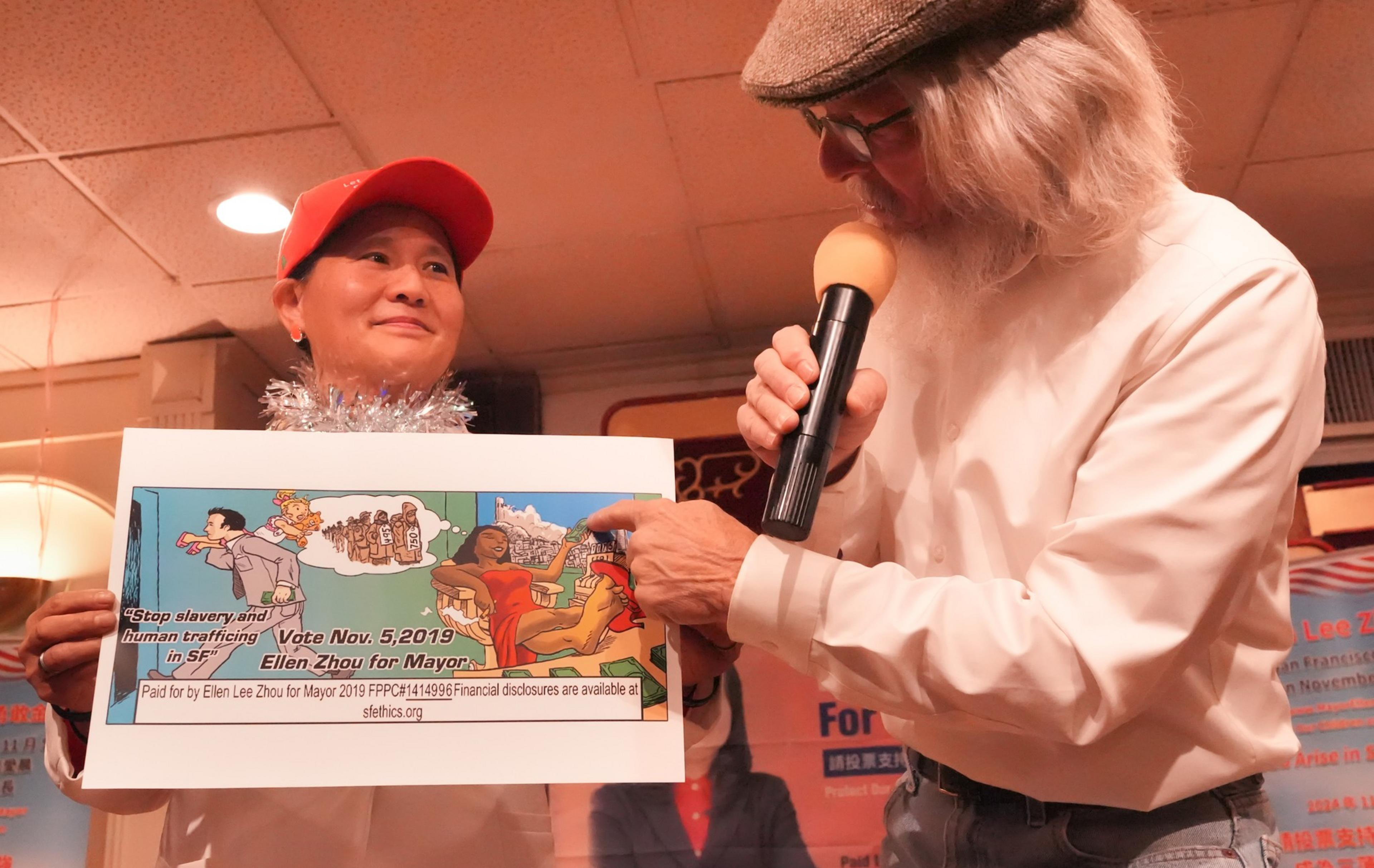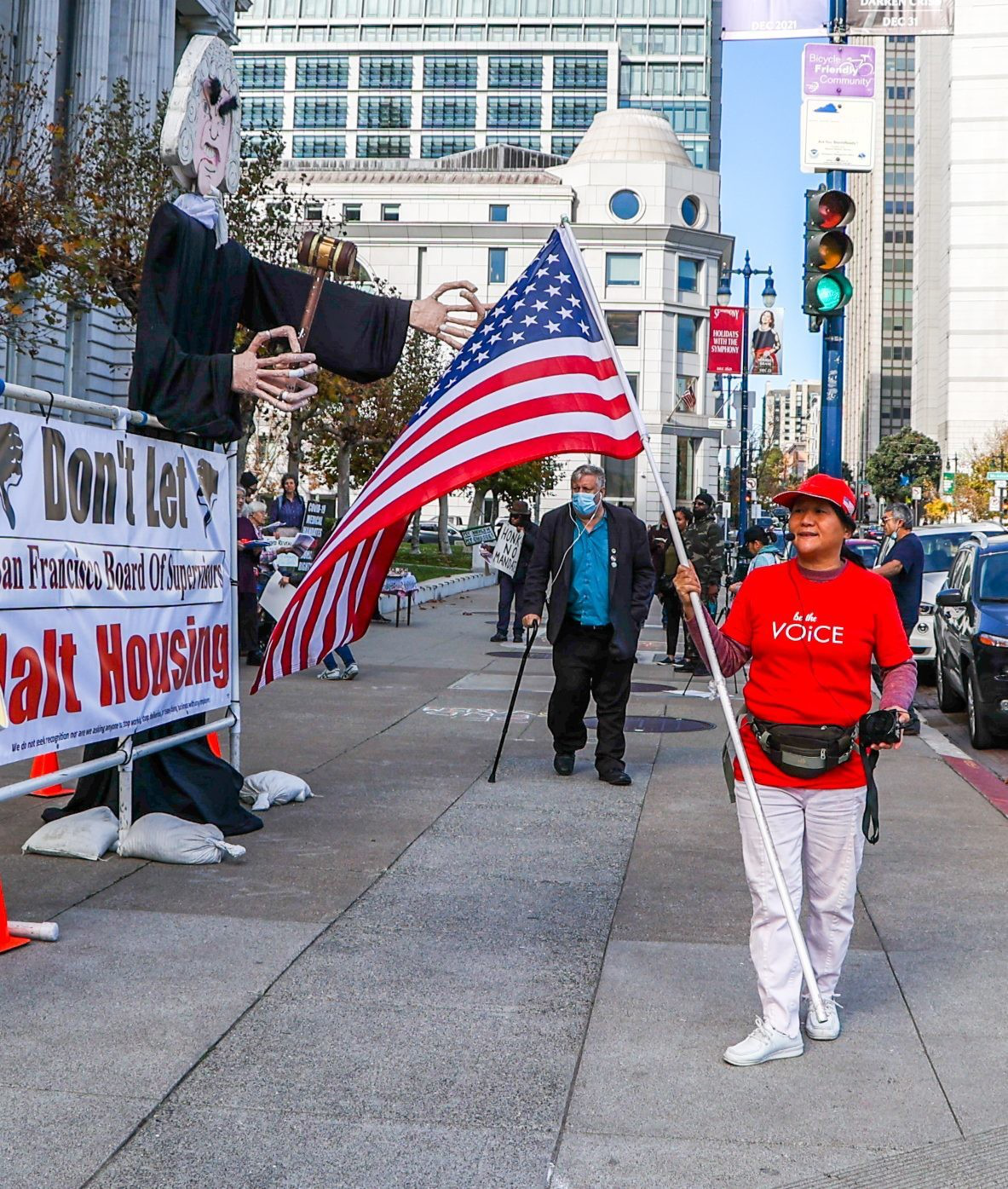Ellen Lee Zhou has made dozens of red hats for her mayoral campaign in San Francisco. But it’s not only because she likes the color and red is auspicious in Chinese culture.
More importantly, Zhou’s hat is intended to evoke former President Donald Trump’s iconic “Make America Great Again” headgear.
“Who else can come in and say, ‘I support Trump?’ Nobody,” said Zhou, 55, who is making her third run for mayor. “I am publicly supporting Trump as a Republican.”
In 2024, as top Democratic mayoral candidates in San Francisco are turning more centrist and embracing tough-on-crime messaging, Zhou is still miles to the right of all of them.
Her far-right views—such as the “plandemic” conspiracy theory and anti-Covid vaccine narratives—mean she has little chance of winning elected office in deep blue San Francisco.

But unlike in her last mayoral campaign in 2019, the crowded and competitive 2024 field of candidates means that Zhou could play the spoiler and make a real impact in the ranked-choice voting.
Five years ago, Zhou got 25,000 first-choice votes. “She’s such an outlier,” said David Ho, a political consultant, referring to Zhou’s combination of Chinese identity, immigrant background and far-right MAGA politics. “The question is, who can get her second and third votes?”
A MAGA candidate in San Francisco
On Sunday night, about 65 supporters showed up to a Chinatown restaurant to support Zhou’s campaign. Some of them were wearing Zhou’s version of the red hat, which says “Let God Arise in San Francisco.” A “Make San Francisco Great Again” banner was displayed onstage.
“We have to have shelters to shield federal criminals. And it’s the so-called ‘sanctuary city,’” Zhou said in her speech. “Have you heard of that?”
In 2018, in the race to replace the late Ed Lee, Zhou received 9,500 first-choice votes, about 3.8% in a highly competitive race that included London Breed, Supervisor Jane Kim and former state Sen. Mark Leno. Breed eventually won by 1% against Leno.
In 2019, with no major challengers, Breed easily won reelection. Zhou was the runner-up, receiving 21% of votes in the ranked-choice contest. Across the whole city, Breed only lost one precinct to Zhou (opens in new tab), a four-block area of Chinatown.

Zhou’s mayoral campaign was infamous. A 2019 campaign billboard, which featured a caricature of Breed and Gov. Gavin Newsom, was slammed by critics as racist (opens in new tab). After the billboard was taken down by the advertising company, Zhou said she was “politically raped” (opens in new tab)— triggering another wave of outrage. Zhou’s billboard spending also violated campaign ethics rules, the Ethics Commission concluded in a March meeting (opens in new tab).
On Jan. 6, 2021, Zhou attended the pro-Trump rally in Washington, D.C. (opens in new tab), that became a riot when protesters stormed into the Capitol. Zhou says she did not go into the building.
Zhou’s right-wing views have bled into her professional life. She is a trained social worker who, after moving to San Francisco from China in 1986, earned two degrees in social work from San Francisco State University. But in September 2022, she was fired from her job at the Department of Public Health for refusing Covid vaccines. She later sued the city for wrongful termination, and the suit is pending. Zhou, who is recently divorced, is financially supported by her siblings.
She sees politics as her calling.
“Everyone needs to live out their brilliant side,” Zhou said of the difficulties she’s facing in life. “I like to be involved in politics.”

Koobie Lam, a longtime San Francisco resident and a conservative Christian, said she has voted for Zhou twice for mayor, and she will support her again this time.
“She loves the city,” Lam said in Cantonese. “Some miracles are happening. God bless her.”
Tom Wong, an Alameda County elected Republican leader and supporter of Zhou’s, argued that supporting Trump doesn’t make one a political extremist.
“Ellen is more center-right,” Wong said. “She only looks like a far-right [candidate] when you’re on the far left.”
An unlikely spoiler?
This year, the mayoral race is already cutthroat.
Along with Breed, major candidates include Board of Supervisors President Aaron Peskin, former interim Mayor Mark Farrell, nonprofit founder and Levi’s heir Daniel Lurie, and Supervisor Ahsha Safaí. Plus, there are dozens of other contenders with less name recognition and less money.
It’s unclear how much money Zhou’s campaign has raised so far. There are no recent financial report filings with the Ethics Commission.
The crowded field of candidates, combined with the city’s ranked-choice voting system, complicates the math for all of the top candidates. Zhou isn’t bothered by it.
“Well, last time I was No. 2,” Zhou said, referring to the 2019 race. “Tell me what they have done to make our lives better than 2019?”

Ho, the political consultant, expects that Zhou could get more than 10,000 first-choice votes, and many of them will be from Chinese American voters. While that’s not nearly enough to win the race, he believes how those votes are redistributed in the ranked-choice system could have a huge impact on the race.
Ho said that in a competitive election circle like this year, a couple of thousand votes could decide who’s the winner. In 2018, when Breed ran against two major competitors, she won by just 2,500 votes.
Specifically, when Zhou was eliminated from the ranked-choice process, 2,787 of her votes were transferred to Breed, the highest among the other candidates, as Kim and Leno only received 1,418 and 1,267 votes from Zhou, respectively.
Ho described Zhou as one of the unconventional Chinese candidates who pop up once in a while, but she could really play a role in this election because there has been a conservative turn among Chinese voters, and ethnic Chinese voters often cast ballots for candidates of their same background.
“Is ethnic affinity [in voting] still alive and well?” Ho asked. “We will find out in Ellen Lee Zhou’s candidacy.”
